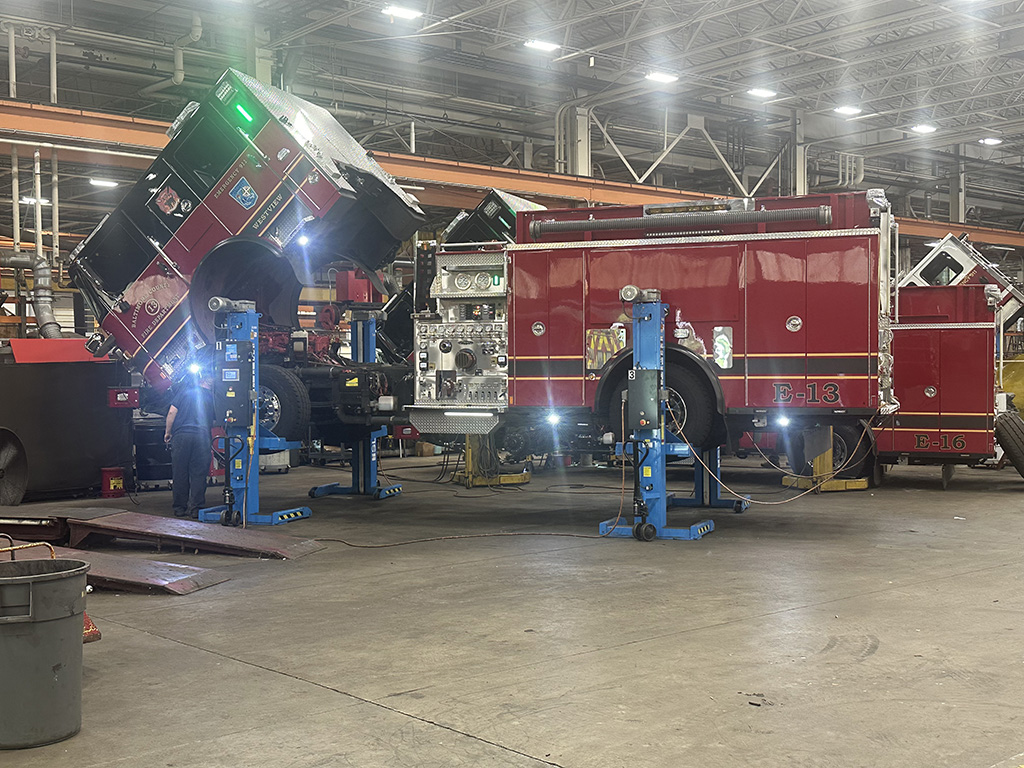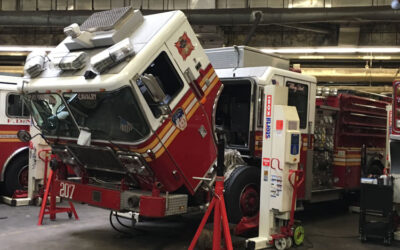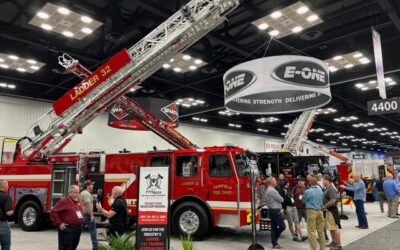APPARATUS: THE SHOPS Michael Huber

The cost of fire apparatus represents a substantial challenge for both career and volunteer fire departments. Effectively addressing these challenges necessitates strategic planning, the pursuit of diverse funding sources, and exploring cost-saving measures such as shared purchasing agreements (HGAC, NOVA, Sourcewell) or acquiring used equipment.
Given the increasing costs associated with fire apparatus, it is crucial to prioritize maintaining existing equipment to extend its operational lifespan and ensure continued readiness.
Selecting a fire apparatus dealer as a repair facility or a technician is a crucial decision, as it impacts the quality, reliability, and support of your emergency response equipment. Here are some key factors to consider:
- Research and recommendations: Start by asking for recommendations from friends or colleagues who have experience with apparatus technicians. Check with surrounding departments.
- Customer service: Evaluate a facility’s responsiveness to your inquiries and its willingness to provide detailed information. Ascertain through references how it handles post repair support.
- Check certifications: Look for technicians who are certified by reputable organizations, such as the National Institute for Automotive Service Excellence (ASE) or Emergency Vehicle Technician (EVT) Certification Commission. This ensures they have the necessary skills and knowledge.
- Experience with your apparatus: Ensure the technician has experience with the specific make and model of your apparatus. All apparatus have unique systems and parts, so experience with your make of vehicle is important.
- Visit the shop: Visit the repair facility to assess its cleanliness, organization, and equipment. A well-maintained shop often reflects the quality of work.
- Geographic location: Consider the dealer’s location relative to your department. A local facility may offer quicker service and support.
- Ask questions: Inquire about the technicians’ experience, specialties, and the types of repairs they handle. Discuss any specific issues your apparatus has, to see how they approach diagnosis and repair.

- Check warranties: Ask about warranties on parts and labor. A good dealer and mechanic should stand by their work and offer some form of warranty.
- Communication: Choose a dealer or technician who communicates clearly and keeps you informed about the status of repairs. Good communication helps build trust and ensures you’re aware of what’s being done to your apparatus.
- Trust your instincts: If you’re uncomfortable or feel pressured, it’s okay to seek out another dealership or technician.
- Trial run: If possible, start with a smaller job or maintenance task to test the technicians’ service quality before entrusting them with more significant repairs.
- Discuss emergency repairs: Since fire apparatus are critical in emergencies, ask about a shop’s/ technician’s ability to handle urgent repairs and turnaround times for critical issues. Check if the dealer/ technician offers 24/7 support or emergency assistance.
- Long-term relationship: Think about the potential for a long-term partnership with the dealer. A good dealer/technician will be a trusted partner in your emergency response efforts.
- Network and partnerships: Dealers with strong industry connections and partnerships can offer better insights, support, and resources.
All apparatus have unique systems and parts, so experience with your make of vehicle is important.
Regardless of the amount of research you perform, conflicts regarding fire apparatus repairs can arise for several reasons, often stemming from communication issues, contractual misunderstandings, or technical problems. Here’s how to identify and potentially address common conflicts:
- Clear communication: Establish and maintain clear, written communication with repair services to ensure all parties understand the scope, cost, and expectations.
- Detailed contracts: Use detailed contracts or service agreements that outline the work to be done, costs, timelines, and warranty terms.
- Regular maintenance: Implement a routine maintenance schedule to catch potential issues early and reduce the need for major repairs.
- Regular inspections: Schedule regular inspections to address minor issues before they become major problems.
- Feedback and review: After repairs, provide feedback and reviews on the service. This helps improve future interactions and provides valuable information to other departments.
By addressing these potential conflict areas proactively and maintaining thorough documentation and communication, you can managefire apparatus repairs more effectively and minimize disruptions to your department’s operations.
Finding a reputable fire apparatus dealer or technician involves a combination of research, checking credentials, and personal judgment. Ensuring that the dealer/technician is experienced with fire apparatus and provides excellent service is key to keeping your apparatus in optimal working condition.
As we all know, effective fire apparatus maintenance is vital for ensuring the safety, reliability, and longevity of this critical equipment. As fire departmentsface mounting financial pressures and rising costs, a proactive approach to maintenance not only maximizes the value of existing assets but also enhances operational readiness and safety. By investing in routine maintenance, embracing strategic planning, and exploring cost-effective solutions, departments can better navigate the challenges of fire apparatus management and continue to provide essential services to their communities.
MICHAEL HUBER is a fire apparatus driver/ operator and fire apparatus fleet manager for the Baltimore County (MD) Fire Department.






